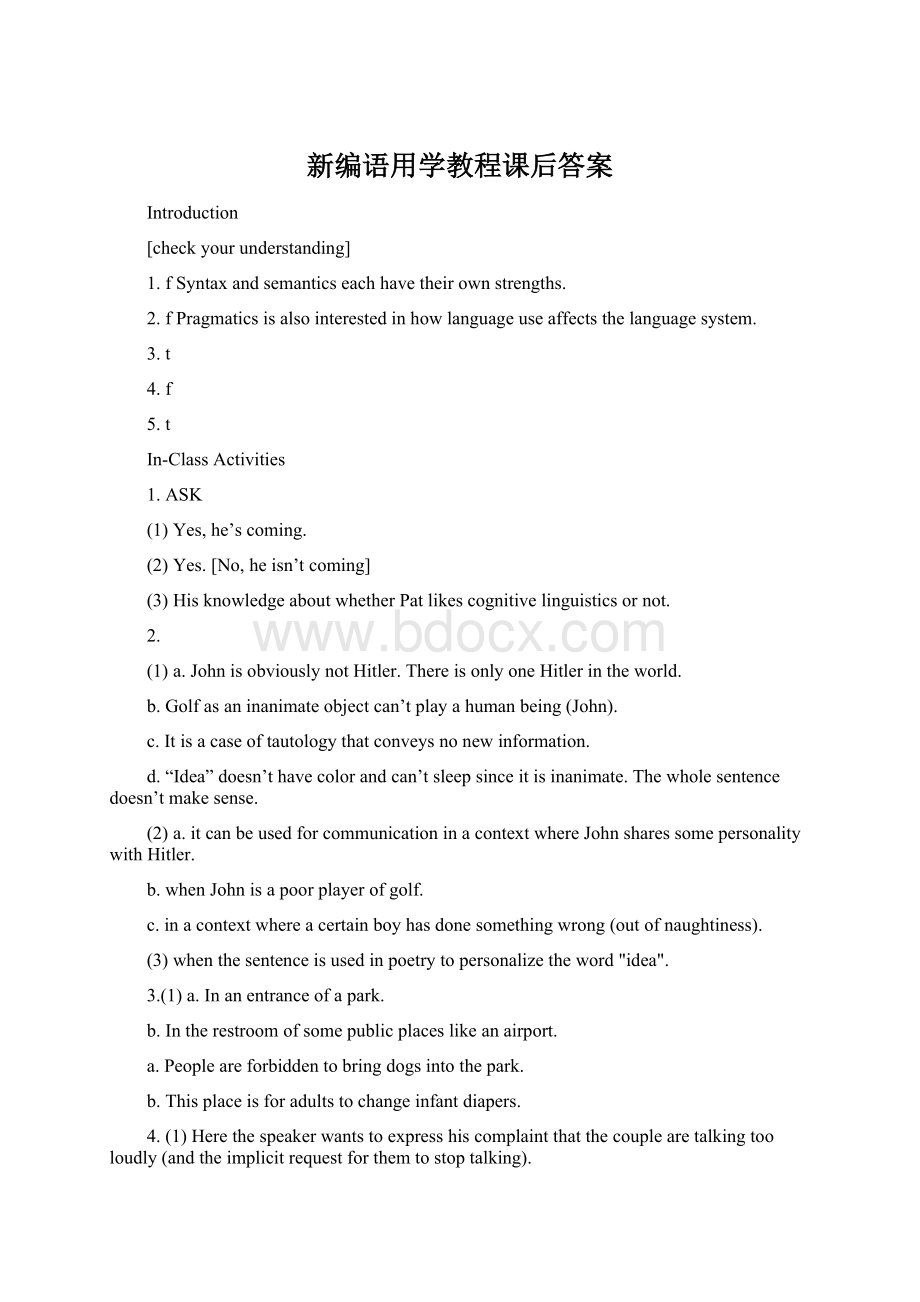新编语用学教程课后答案.docx
《新编语用学教程课后答案.docx》由会员分享,可在线阅读,更多相关《新编语用学教程课后答案.docx(23页珍藏版)》请在冰豆网上搜索。

新编语用学教程课后答案
Introduction
[checkyourunderstanding]
1.fSyntaxandsemanticseachhavetheirownstrengths.
2.fPragmaticsisalsointerestedinhowlanguageuseaffectsthelanguagesystem.
3.t
4.f
5.t
In-ClassActivities
1.ASK
(1)Yes,he’scoming.
(2)Yes.[No,heisn’tcoming]
(3)HisknowledgeaboutwhetherPatlikescognitivelinguisticsornot.
2.
(1)a.JohnisobviouslynotHitler.ThereisonlyoneHitlerintheworld.
b.Golfasaninanimateobjectcan’tplayahumanbeing(John).
c.Itisacaseoftautologythatconveysnonewinformation.
d.“Idea”doesn’thavecolorandcan’tsleepsinceitisinanimate.Thewholesentencedoesn’tmakesense.
(2)a.itcanbeusedforcommunicationinacontextwhereJohnsharessomepersonalitywithHitler.
b.whenJohnisapoorplayerofgolf.
c.inacontextwhereacertainboyhasdonesomethingwrong(outofnaughtiness).
(3)whenthesentenceisusedinpoetrytopersonalizetheword"idea".
3.
(1)a.Inanentranceofapark.
b.Intherestroomofsomepublicplaceslikeanairport.
a.Peopleareforbiddentobringdogsintothepark.
b.Thisplaceisforadultstochangeinfantdiapers.
4.
(1)Herethespeakerwantstoexpresshiscomplaintthatthecouplearetalkingtooloudly(andtheimplicitrequestforthemtostoptalking).
(2)Bysayingso,theyoungmanwantstoconveytheirrefusalto“my”request.
Thebackgroundknowledgeweneedisthatsinceitisusuallyimpolitetolistentootherpeople’privateconversation,itisnormalthat“I”can’thearaword(thusthecouplecancontinuetheirtalk).
5.
(1)Thisnoticeimpliesthatallthosewhojumptheredlightareuncivilized,whateverthereason.
(2)讲卫生的人不会随便吐痰。
6.
(1)Thisisanadvertisementforaholidayinnanditsfoodissodeliciousthatitcanmakethecustomer’swifejealous.The“Frenchtoast”probablymeansatypeofspecialtyprovidedbythisholidayinn.
(2)C:
你去哪里?
吃饭了没?
E:
Howareyou?
How’severythinggoing?
7.
(1)Hemeanshedoesn’tspeakFrench.
(2)Russianmajorsdon’tspeakFrench.
(3)Yes.Ithelpstoindicateanegativeanswer.
8.
(1)a.Heuses“that”undertheassumptionthathismomknowswhichletterisbeingreferredto.
b.Heusesanimperativesentencetoaskhermothertoclosethewindow,whichisimpolite.
(2)Johnny:
Mom,PingPingiscomingtovisitusthisafternnoon.
Mother:
WhoisPingPing?
(3)Wang:
It’snotmyfault,isit?
Li:
Yes.
-----------------
Nativespeaker:
Hi,youlookgood.
Zhang:
Notgood,notgoodatall.
ExercisesTask3.
1. whenwegetsomeonetodosomething,wetendtominimizetheefforttobeinvolved,butwhenwecomplainwetendtoexaggeratethecomplaint.Peoplewanttobepolitebymitigating(缓解,减轻,平静)theimposition,whichisface-threatening.
2.Thefirstimperativeisageneralgrammaticalform,butthesecond,thoughstillanimperative,canbeusedtosoundmorepolitebecauseoftheadditionof"willyou"
3.(intheoffice)
Boss:
Cometomyofficelater.
Clerk:
Yes,sir.
--------
(duringtheafternoontea)
Boss:
Howisyourdad,Tom?
Clerk:
He’sfine.Thanks,Pat.
4.Hewantstosuggestthathedidnotbreakthewindowbecausehewasengagedwith(?
)insomethingelseinotherplaces.
5.InthenovelTheCatcherintheRye,Holden,amiddleschoolstudentalwaysbreaksthepragmaticconventionsandinthatwayshowshisrebellion.
6.WhileweteachEnglishtoChinesestudents,wenotonlyimpartlinguisticinformation(phonetics,phonology,morphology,andsyntaxofEnglish)butalsopragmaticinformation(appropriateuseofEnglishindynamiccontext).Forinstance,howwecanusethequestiontag(反了?
tagquestions)tosoundmoretentativeandbepolite.
Unit1
[Checkyourunderstanding]
1.f ThatistheviewheldbyJohnAustinintheearlystage.
2.f Implicitperformativeutterancesdonothaveaperformativeverb.
3.f
4.f Thecompletionoftheperlocutionaryactrequirestheaddressee’scooperation.
5.t
In-ClassActivities
1.
(1)Ifyou’veeversaid“Ipromise”or“Iapologize”,youhaveperformedthoseactionsbythesimpleactofsayingthem.But“Iknow”and“Ibelieve”aredeclarative.Sayingthemdoesnotbringaboutanyimmediatechangeinthebelieforknowledgeofthespeaker.
(2)a.Iwishyouagreatsuccess.
IadmitI’mwrong.
b.Imisunderstandyourpoint.
Iseewhatyoumean.
(3)Yes.Forexample,whenwesay“我在这里向你道歉”,weareperformingtheactofapologizing.(?
)
2.
(1)“Afullapology”heremeansawhollyperformativeutteranceofapologylike“WeapologizetotheChinesegovernmentandtheChinesepeople”.Indeed,“sorry”isnotaperformativeverb.
(2)Tosomeextent,“sorry”canimplicitlyperformtheactofapology.
3.
(1)Thekidnapperintendstoperformtheactsofthreateningandrequiring.
(2)Hewantstomakehiswordssoundlikeanadviceinsteadofathreatening.
4.
(1)a.locutionary